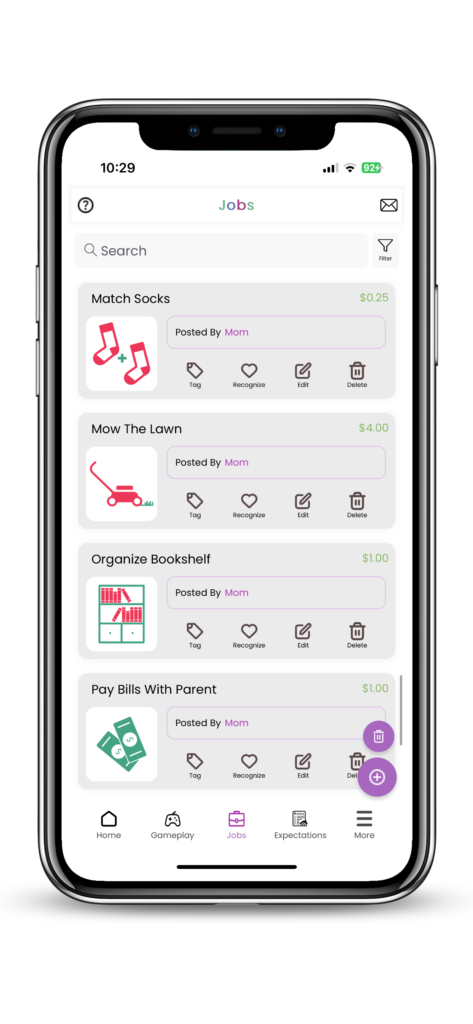The Hire and Fire your Kids app helps parents organize and assign household chores, ensuring tasks are evenly distributed and completed efficiently. It promotes responsibility, teamwork, and a sense of accomplishment among children. This structured approach reduces family friction and ensures that household tasks are completed consistently.
- What It Is: Chore management through the Hire and Fire Your Kids app involves creating, assigning, and tracking household chores for children. This system helps parents distribute tasks fairly and ensures that children understand their responsibilities.
- How It Works: Parents use the app to set up a list of household chores, assigning tasks to children based on age and capability. Each chore is assigned a point value or reward. Children complete these chores and log their completion in the app, where parents can monitor progress, provide feedback, and issue rewards. The app’s tracking features help maintain consistency and accountability.
Benefits
- Organized Task Distribution: Ensures that household chores are evenly distributed among family members.
- Promotes Responsibility: Encourages children to take ownership of their assigned tasks.
- Enhances Teamwork: Teaches children the value of working together to maintain the household.
- Reduces Family Friction: Creates a clear and fair system for chore assignments, reducing arguments and misunderstandings.
- Encourages Accountability: Helps children understand the importance of completing tasks and meeting expectations.
Examples
- Daily Chores: Tasks like making the bed, tidying up rooms, and feeding pets.
- Weekly Chores: Rotating responsibilities such as vacuuming, dusting, and doing laundry.
- Seasonal Tasks: Seasonal chores like raking leaves, shoveling snow, and garden maintenance.
- Special Projects: Larger tasks like organizing a room, garage cleanup, or preparing for a family event.
Tips
- Age-Appropriate Tasks: Assign chores that match the child’s age and abilities to ensure success and avoid frustration.
- Consistent Routine: Maintain a consistent schedule for chores to help children develop a routine.
- Positive Reinforcement: Use rewards and praise to motivate children and reinforce positive behavior.
- Regular Review: Periodically review and adjust the chore list to keep it relevant and engaging as children grow and develop.
Related Use Cases
- Responsibility Training: Teaching children accountability through consistent task assignments.
- Daily Chores: Establishing and maintaining a daily routine of household tasks.
- Teamwork Promotion: Encouraging cooperation and collaboration among siblings through shared responsibilities.
- Sharing Household Responsibilities: Ensuring everyone contributes to household tasks.
Real-World Examples
- Family Cleaning Day: Designate a day each week for family members to complete various cleaning tasks together.
- Chore Rotation Schedule: Implement a rotation schedule to ensure fair distribution of chores among family members.
- Seasonal Cleaning Projects: Plan and execute seasonal cleaning tasks like spring cleaning or holiday preparation.
Success Stories
- Case Study:
- The Smith Family: The Smith family used the app to assign and manage daily chores. By tracking completion and providing rewards, they saw improved household cleanliness and increased responsibility among their children.
“The app has helped our family stay organized and on top of chores. Our kids have become more responsible and our house is cleaner!”
– Parent Testimonial
Resources and Tools
- Links to Articles and Guides:
- Printable Worksheets:
- Apps and Tools:
How to Manage Chores with Hire and Fire your Kids: A Step-by-Step Guide
If you’d like to upgrade your chore management operation, I can help. It’s what I use. Managing chores can be seamless with the Hire and Fire Your Kids app where your kids can learn through play. Here’s how to get started:
- Download and Set Up the App: Download the app and create profiles for each child.
- Assign Chores: Use the app to assign age-appropriate chores and set deadlines. Or, your kids can “apply for jobs” and assign themselves.
- Track Progress: Monitor their progress through the app and provide feedback. Give out warnings or recognition as needed.
- Incentivize with Rewards: Set up and customize a reward system that motivates your child to complete chores on time. Use KidsKash to pay them out for the money they earn with their chores.
- Review and Adjust: Regularly review chore assignments and adjust based on your child’s growth and performance.

Chore Management FAQs
- Common Questions:
Q: How can I ensure my children stick to their chore schedule?
A: Consistency and positive reinforcement are key. Use rewards and praise to encourage regular completion of chores.
- Tips for Success:
- Involve children in creating the chore schedule to give them a sense of ownership.
- Use visual aids like charts and checklists to make the chore schedule clear and accessible.

